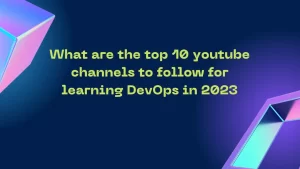Continuous integration/continuous deployment (CI/CD) pipelines have become a vital part of software development and delivery in today’s fast-paced tech environment. Kubernetes has emerged as the platform of choice for deploying and scaling containerized applications, creating a huge demand for professionals with Kubernetes CI/CD pipeline skills.
If you are looking to gain proficiency in Kubernetes CI/CD pipeline setup, here are the top 5 courses you should consider:
Table of Contents
1. Kubernetes for Developers: Deploying Your Code (LinkedIn Learning)
This course is ideal for developers looking to learn how to use Kubernetes for deploying their applications. Instructor Karthik Gaekwad explores how to build a CI/CD pipeline using Jenkins and deploy it to a Kubernetes environment. You will also learn how to monitor applications with Prometheus and Grafana, and how to troubleshoot deployment issues.
Course Contents:
- Introduction to Kubernetes and Jenkins
- Building CI/CD pipelines with Jenkins
- Monitoring and troubleshooting deployments
- Real-world project scenarios
2. Deploying Containerized Applications Technical Skills (Coursera)
Developed by IBM, this course provides a comprehensive understanding of Kubernetes architecture and its role in deploying containerized applications. It also covers the basics of CI/CD pipelines and explains how to use Jenkins and Travis CI for building pipelines.
Course Contents:
- Basics of Docker and Kubernetes
- Understanding Jenkins and Travis CI for CI/CD pipelines
- Hands-on projects involving Kubernetes deployments
- Quizzes and peer-reviewed assignments
3. Kubernetes CI/CD Pipelines: A Continuous Deployment Crash Course (Udemy)
This Udemy course, taught by Edward Viaene, dives deep into the technical aspects of setting up a Kubernetes CI/CD pipeline. It covers Helm and how it can be used to package and deploy applications on a Kubernetes cluster and also includes a section on setting up automated testing and deployment with Jenkins.
Course Contents:
- Deep dive into Helm and its usage in Kubernetes
- Setting up Jenkins for CI/CD pipelines
- Automated testing and deployment
- Hands-on projects with real-world scenarios
4. Building a CI/CD Pipeline (edX)
This course, offered by the Linux Foundation, offers a broader perspective of CI/CD pipelines. While it doesn’t focus exclusively on Kubernetes, it does provide a thorough understanding of the CI/CD principles that apply to all environments, including Kubernetes. The course includes practical lab sessions using Jenkins, Travis CI, and GitLab CI.
Course Contents:
- Basics of CI/CD
- Using Jenkins, Travis CI, and GitLab CI for creating pipelines
- Security and compliance in CI/CD
- Practical lab sessions
5. Kubernetes: Continuous Delivery with Spinnaker (Pluralsight)
This Pluralsight course is unique because it introduces Spinnaker, a continuous delivery platform built by Netflix, which is widely used for deploying applications on Kubernetes. Instructor Richard Chesterwood demonstrates how to use Spinnaker to build a sophisticated deployment pipeline, including canary deployments and automated rollbacks.
Course Contents:
- Introduction to Spinnaker
- Configuring and running Spinnaker on Kubernetes
- Creating deployment pipelines
- Canary deployments and automated rollbacks
Whichever course you choose, you are sure to enhance your Kubernetes CI/CD skills and make yourself more marketable in the tech industry. Remember, the key to learning is practicing – so be sure to get hands-on experience and apply your learning to real-world scenarios. Happy learning!
FAQ Section
Q1: Do I need prior knowledge of Kubernetes to start these courses?
A1: While some of these courses offer a basic introduction to Kubernetes, having a fundamental understanding of Kubernetes and its architecture can be beneficial. Familiarity with containerization, especially Docker, is often necessary.
Q2: Is Jenkins the only tool used for setting up CI/CD pipelines in Kubernetes?
A2: No, Jenkins is one of the popular tools used, but there are other tools such as GitLab CI, Travis CI, and Spinnaker that can also be used to set up CI/CD pipelines in Kubernetes.
Q3: Why should I learn about Kubernetes CI/CD pipelines?
A3: Learning Kubernetes CI/CD pipelines allows you to automate the deployment, scaling, and management of applications, which can significantly improve the efficiency and reliability of software delivery.
Q4: How long does it take to complete these courses?
A4: The duration of each course can vary, but most can be completed within a few weeks if you dedicate a few hours per week. Each platform typically provides an estimated course duration.
Q5: Are there any prerequisites for these courses?
A5: Understanding basic DevOps concepts and familiarity with Docker and containerization is typically beneficial. Some courses may require a basic understanding of Linux and command-line interface (CLI) usage.
Q6: Are there any certification opportunities associated with these courses?
A6: Platforms like Coursera, edX, and LinkedIn Learning often provide a certificate of completion that you can share on your LinkedIn profile or CV. Udemy and Pluralsight usually offer completion certificates as well. Be sure to check the course details for information on certification.
Q7: Do these courses offer a hands-on experience?
A7: Most of these courses offer practical exercises, real-world scenarios, and projects that can give you hands-on experience in setting up Kubernetes CI/CD pipelines. This practical experience is crucial for consolidating your learning and developing real-world skills.
Q8: Are there any free courses on Kubernetes CI/CD pipeline setup?
A8: Some of the mentioned courses might offer free trials, but usually, they are paid. However, you can find free tutorials and resources on platforms like YouTube or technical blogs. Remember, these might not offer the structured learning experience and hands-on opportunities provided by the recommended courses.


